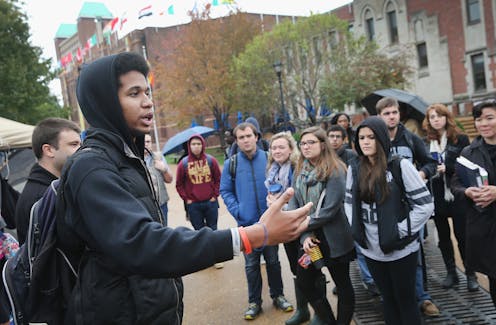People are more likely to react to a Black person's story of injustice – even if it happened to someone who is white
- Written by Anne Hamby, Assistant Professor of Marketing, Boise State University

The Research Brief[1] is a short take about interesting academic work.
The big idea
People appear more willing to boycott a retailer in response to a video message about a consumer’s experience of injustice while shopping when the narrator is Black, even when the source of the actual information is from a white person, according to research I conducted with several colleagues that’s currently under peer review.
We wanted to observe whether and how the race of the person telling a story of racial injustice affects the reaction of their audience. So we conducted three studies that manipulated details about the race of the storyteller and victim to isolate the role the storyteller’s race plays.
In the first study, we recruited 370 white male participants using a crowdsourced academic research panel. We asked them to watch a video in which a professional male actor portraying a consumer describes shopping in a store with his family and being unfairly suspected of shoplifting.
Half the participants heard the story from a white man, the rest from a Black person – who was seen as more credible on the issue in an earlier test.
But after finishing the story, the man reveals that the actual source of the tale was his friend Jay, who was reluctant to speak out. A picture of him is displayed on the screen. At random, some participants see a Black man, others see a white man. Others weren’t given this information, as a control condition.
Participants were then told that the speaker in the message is organizing a boycott and asked how willing they’d be to support it.
We found that people were most likely to support taking strong punitive actions against the retailer if the initial source of the information was Black, even when he reveals the incident happened to his white friend. But if the storyteller was white, there was significantly less support for a boycott – though that changed if the incident happened to a Black friend.
To better understand what is going on here, we conducted a second study, this time with 301 white men. The setup was the same except we didn’t use a control and asked more follow-ups. In particular, we asked participants to rank how morally outraged they were about the story – a process that has been explored in the literature[2] on consumer ethics and morality.
We confirmed our earlier results and also found that the Black source causes more moral outrage - a negative moral emotional reaction to unethical behavior. In other words, the Black storyteller was more effective at causing perceptions of injustice, which subsequently reduced their likelihood of altering their initial judgment in response to new information.
A third study, involving 300 white men and women, replicated the study but revealed the true source of the story of racial injustice at the beginning of the video. The impact was that participants were less likely to support punitive action if they learned at the outset that the actual source was white, even if the storyteller was Black.
Why it matters
More and more research on the persistence of misinformation[3] shows that people often do not update their beliefs formed in response to a message in light of new information. This past research[4] focuses on the enduring influence of message content.
Our research suggests that source-related judgments can exert similar enduring influence. For policymakers and others trying to share information with the public, this shows the importance of who they choose as the source of the message – such as a well-known celebrity to combat vaccine misinformation[5]. For the rest of us, it helps to recognize this bias and pay attention to the source of a message – whether it’s in a television ad or in a tweet – and consider the message separate from the source.
What’s next
We would like to test how revealing source demographic information at the end of a message exerts influence in other contexts, such as sexual harassment. We also plan to move beyond intention measures to examine influence on participants’ actual behavior.
[Over 140,000 readers rely on The Conversation’s newsletters to understand the world. Sign up today[6].]
References
- ^ Research Brief (theconversation.com)
- ^ has been explored in the literature (www.doi.org)
- ^ persistence of misinformation (doi.org)
- ^ This past research (doi.org)
- ^ celebrity to combat vaccine misinformation (www.forbes.com)
- ^ Sign up today (memberservices.theconversation.com)







